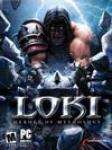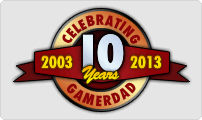Review – Loki: Heroes of Mythology (PC)
 Everyone like a good hack & slash action-RPG with hordes of monsters to kill and loads of shiny loot to gather up, right? Must be so, since ever since Diablo games have come along with a very similar formula. Some – like Nox or especially Divine Divinity – actually feature deep RPG plots and characters along with intense click-action combat. But most games in the genre gave been content with emulating a very familiar recipe over and over again. Some such as Sacred remain deeply rooted in the fantasy genre, while others such as Silverfall or Titan Quest take players outside of the typical world of swords and sorcerers in an attempt to bring new things to the genre. Enter Loki, the next game in the genre with yet another new take on the ‘Diablo clone’ formula.
Everyone like a good hack & slash action-RPG with hordes of monsters to kill and loads of shiny loot to gather up, right? Must be so, since ever since Diablo games have come along with a very similar formula. Some – like Nox or especially Divine Divinity – actually feature deep RPG plots and characters along with intense click-action combat. But most games in the genre gave been content with emulating a very familiar recipe over and over again. Some such as Sacred remain deeply rooted in the fantasy genre, while others such as Silverfall or Titan Quest take players outside of the typical world of swords and sorcerers in an attempt to bring new things to the genre. Enter Loki, the next game in the genre with yet another new take on the ‘Diablo clone’ formula.
Loki tells the tale of the world under attack from Seth, the Egyptian god of darkness and evil. It weaves in four mythologies – Egyptian, Greek, Norse and Aztec – as players take on quests for their respective gods to combat the mayhem Seth has created in their time. The four mythologies are embodied by the four playable characters: male Egyptian sorcerer, female Aztec shaman, male Norse warrior, or female Greek fighter. Each character starts in their own time and is confronted by their primary god of ‘good’ and tasked to look into the terrible things happening throughout the land. As you proceed through each mythology you are faced with tasks that take you through familiar areas and have you meeting up with familiar names as you work towards the ultimate goal of defeating Seth and restoring peace to all of the mythologies.
How can I describe this game simply? Dreadfully long and boring. And did I mention that it was entirely too long to be any fun?
Perhaps that is not really fair – the game is very challenging, as each task will set you off through perhaps five or six areas before you reach your goal. And each of those areas is populated by up to a few hundred monsters and enemies with a single purpose – battle you. So you slog through area after area, killing hordes of enemies – which is generally not too hard when taken one at a time, but can be more challenging when they all rush at you with absolutely no survival instinct.
The game looks and sounds very nice in general – the different times each have their own authentic looking theme and monsters and other enemies appropriate to the mythology. Graphics are pretty good in terms of characters, monsters and the animations and effects. The music is fairly typical of the genre and really didn’t stick in my head at all, and the voice acting was minimal and also forgettable. But none of that would matter if the gameplay was solid.

The leveling and skill systems also work well – you gain experience by killing stuff while on quests. You might also gain some experience from the quests themselves, but to be honest I didn’t notice and the amount would be trivial compared to the ‘combat pay’. That experience translates into gaining levels, which provides you with attribute points you can allocate among any of the typical strength / dexterity / intelligence type statistics. The skill tree is split into sections for each mythology, but what is interesting is that your progress in each area towards gaining new skill points is based entirely on using skills from that family. Also, you are awarded skill points by completing quests for the gods. It is a nice system that provides plenty of advancement points while focusing on rewarding the player for things they actually use.
But it is in the combat that the game falters. Combat is fairly typical – left click for a standard attack and right click to use a skill or spell. Health and status are displayed for the player and enemies well within the view as you click your way through endless streams of monsters. Most monsters take only a few hits or spells to kill, and you regenerate health and mana fast enough that the game becomes a simple task of endless hit-and-run. Within each mythology the areas look and feel nearly identical, with a few monster differences to distinguish one dungeon from the next.
I am a great fan of of long games and huge dungeons – I am currently in the midst of yet another run through of Divine Divinity, which has generally taken me ~120 hours to complete, and features an early dungeon huge enough that it has turned away many a hardcore RPG fan. So believe that it is stunning for me to hear myself say that this game is just entirely too long. You will certainly ‘hit your groove’ in endless killing sessions where you swear that you’ll clear ‘just one more area’ and end up awake into the middle of the night. But most of the time you will simply be tired of the endless parade of sameness, of the tedium of doing the same thing again and again.
The other lure of this sort of game is finding cool loot. Let me just say that I stopped bothering opening chests after a while and only grabbed very rare items from monster drops. It just wasn’t worth the trips back to town to sell stuff off. I got richer and richer and still gained better equipment as I progressed. Some improvements were found, and others were made. The game has a promising blacksmith system where you can remake or otherwise augment weapons and armor to make better stuff. However, when you are as picky about your loot as I am, the only reason you will visit the blacksmith is because these augmentations often make an item worth more than the sum of its’ components.
At the risk of spoiling the game progression, the flow of the game doesn’t help. You choose your character, and complete their mythology and are then given access to the Thresholds of Time, a means of connecting the different mythologies so you can continue your quest to find and destroy Seth. As you might guess, your character must then go to each and every other mythology and complete all of those quests as well. And then you get to engage in the final quest for Seth. Yippie! And if you were wondering about using other characters, guess what? You run through the same quests you did when you visited their time, only this time as a low level warrior or mage from their mythology. Which is interesting for only a short while.
So we have a game that looks pretty good, but has boring combat, useless loot drops, and a mind-numbingly artificial length enhancement that absolutely kills any desire for replayability. Multiplayer consists of some minor fun with PvP (player vs. player) and co-op modes for up to six players. The problem – finding someone to play with; games like this live or die on the strength of their multiplayer communities, so when a game fails to build any sort of community you know it is not long for this world. But I understand why there is no community – many folks I have talked to found the demo dreadfully boring … and that was the section I thought of as ‘the good part’. By the time you finally kill Seth, you will never want to touch the game again. Or better yet, if you have reached the end of this review I hope that I have convinced you that you should never bother touching it in the first place.
Score: 2.5 / 5 Stars.





April 3rd, 2008 at 12:59 pm
but can be more challenging when they all rush at you with absolutely no survival instinct.
that is there way of killing you. when they all rush at you they do colectivly more damage.
prity good survival if you ask me.